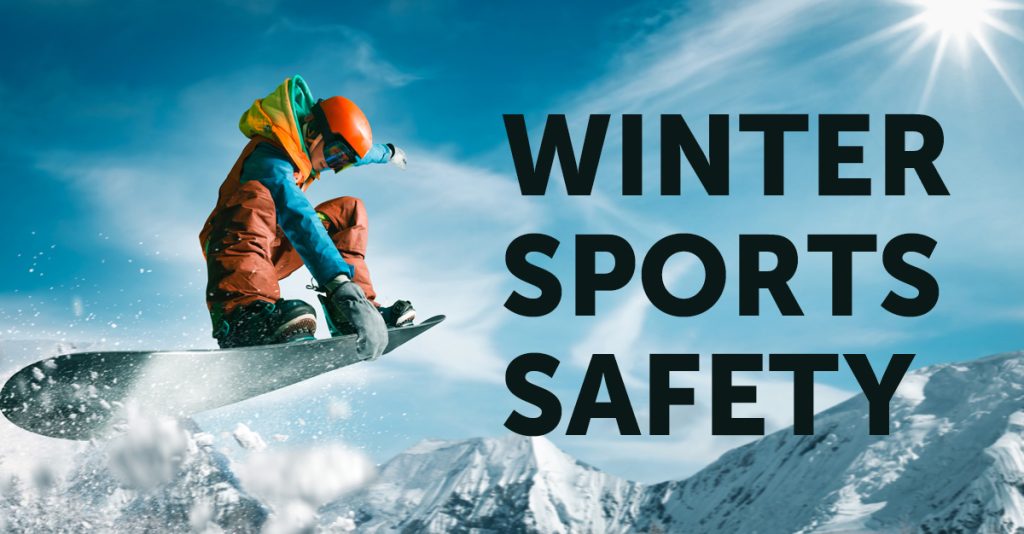Winter is a favorite time of year for outdoor enthusiasts. Whether you’re racing down snow-covered slopes on skis, carving trails on a snowboard, or enjoying the thrill of ice hockey or snowmobiling, winter sports offer a fun and invigorating way to stay active. But while these activities are exciting, they also come with inherent risks—especially when it comes to head injuries and traumatic brain injuries (TBIs).
According to Bayhealth Neurosurgeon Dr. Amit Goyal, winter sports injuries range from mild concussions to life-threatening brain bleeds. Fortunately, by taking the right precautions, you can significantly reduce the risk of serious injury and continue enjoying your favorite cold-weather pastimes.

Common Winter Sports and Associated Risks
Popular Winter Sports Activities
- Skiing and Snowboarding
- Ice Skating and Ice Hockey
- Snowmobiling and Sledding
- Snowshoeing and Cross-Country Skiing
While these winter activities are great for cardiovascular health, coordination, and building strength, they often involve high speeds, hard falls, and collisions—all of which increase the potential for brain trauma.
Common Winter Sports Injuries
- Concussions
- Skull fractures
- Epidural and subdural hematomas
- Whiplash and cervical spine injuries
- Broken bones and sprains
Understanding Brain Trauma in Winter Sports
Signs and Symptoms of Concussions
Recognizing the early warning signs of a concussion can be life-saving. Be alert to symptoms such as:
- Headache or pressure in the head
- Confusion or trouble thinking clearly
- Dizziness or loss of balance
- Blurred or double vision
- Nausea or vomiting
- Sensitivity to light or sound
- Memory loss or amnesia
- Unusual emotional responses
- Difficulty sleeping or fatigue
The Danger of Second Impact Syndrome (SIS)
Second Impact Syndrome occurs when a second concussion is sustained before the brain has fully healed from an initial one. This can lead to rapid brain swelling, permanent damage, or even death. Never resume activity without medical clearance.
Winter Sports Safety Tips from Medical Experts
1. Know Your Skill Level and Stay Within Limits
While pushing your limits might seem appealing, it’s crucial to stick to trails and activities suited to your current skill level. Overconfidence often leads to unnecessary risks and injuries.
2. Always Wear a Helmet and Protective Gear
A properly fitted helmet can significantly reduce the risk of traumatic brain injury. Ensure that helmets and other safety gear are:
- Approved for the sport you’re playing
- Free from cracks or damage
- Properly fitted for your head and body size
3. Take Lessons to Improve Technique
If you’re new to a sport—or even slightly rusty—invest in a lesson or refresher course. Learning how to fall safely and how to stop properly can drastically reduce your injury risk.
4. Create a Safe Environment
- Pad any hard barriers or poles
- Inspect the playing surface for uneven ice or snow
- Monitor for weather conditions that may increase risk
- Encourage safe play by discouraging roughhousing or aggression
5. Strengthen Your Neck and Core Muscles
Research shows that strong neck muscles can help absorb impact and reduce the chance of concussions. Add neck and core strengthening exercises to your routine to build a better buffer against injury.
What to Do If You Suspect a Concussion
Immediate Steps
- Stop activity immediately
- Alert a coach or supervisor
- Get evaluated by a medical professional
- Do not return to the sport until cleared by a physician
Concussions may seem mild but can have long-term effects if not handled properly. It’s better to sit out a week than risk a lifetime of complications.
Tips for Parents and Coaches
- Educate young athletes about brain trauma
- Promote a “safety-first” culture in teams and groups
- Set a good example by always wearing protective gear
- Create clear return-to-play protocols
Winter sports are incredibly rewarding, but they require mindfulness and preparation. As a parent or coach, you play a vital role in ensuring that young athletes prioritize their health and safety above all.
FAQs:
Q1: What are the most dangerous winter sports for head injuries?
A: Snowboarding, skiing, and ice hockey are among the most high-risk sports for head injuries due to speed, hard surfaces, and frequent collisions.
Q2: Can you get a concussion without hitting your head?
A: Yes. Rapid deceleration or whiplash can cause the brain to move within the skull, leading to a concussion without a direct blow.
Q3: How long should you wait before returning to sports after a concussion?
A: This depends on the severity of the concussion and your doctor’s advice. Some recover in days, others need weeks or longer. Only return after medical clearance.
Q4: Is a helmet enough to prevent a concussion?
A: Helmets significantly reduce the risk but do not eliminate it. Using proper techniques and avoiding high-risk behavior is also crucial.
Q5: Are children more vulnerable to concussions?
A: Yes, children’s brains are still developing, making them more susceptible to long-term effects of brain trauma. Extra precautions should be taken with young athletes.




